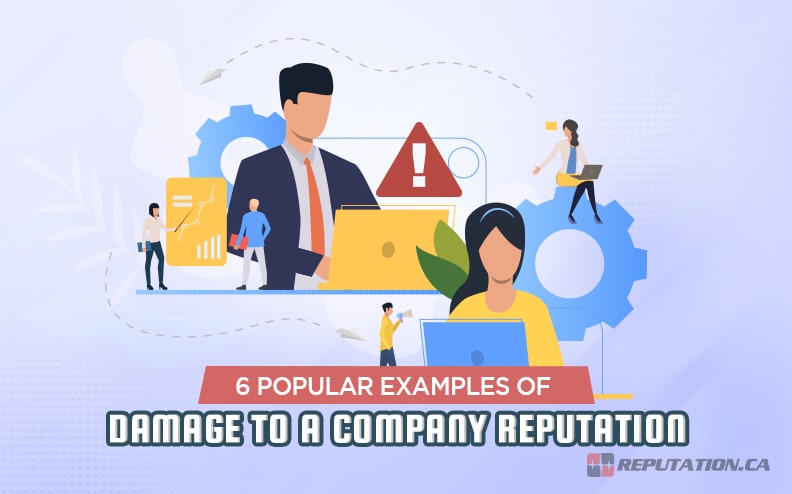A company’s reputation is a highly sensitive part of a successful business. When your reputation is damaged, it can impact your company’s success. While this can be devastating to your company, it is also disproportionately easy for a company’s reputation to deteriorate. Even allegations can do a fair amount of damage to a company’s public image and wreck your business. This issue has turned reputation management into a vital part of running a company. However, the only way to effectively preserve a company’s reputation is to know what can damage it.
A company’s reputation is susceptible to multiple kinds of damage with varying results. Some types of damage are minor and can be easily repaired with the right public response. Other forms of reputational damage are more severe and can impair your company’s ability to retain its customer base. These more severe forms of reputational damage can take a lot longer to undo and can leave your company struggling for some time. In addition, some types of reputational damage are more common and more likely to affect your company than others. This article will serve to help you distinguish these forms of reputational damage.
#1: Accounting Errors
Accounting errors are a severe type of reputational damage and a financial strain on the company. Accounting troubles can be highly detrimental to a company’s public image and success because one error can air a great deal of dirty laundry.
When a single error is reported in a company’s financial record for the fiscal year, the results for the last two years need to be restated. This restatement of accounting severely affects the company’s ability to raise capital for future business ventures. This can deeply affect the company’s ability to pursue new projects and finance expansion. However, it can also seriously impact the company’s public image.

When you are forced to repost the accounting results for the last two years, it damages your company’s credibility. If your company is seen as an entity that cannot report its finances accurately, it causes the consumer base to question your company’s ethics. Customers and other businesses will assume your company is hiding finances even if the situation was a minor issue like a misplaced decimal point or a typo. Eventually, this accounting error can cause bad publicity and a mounting scandal as rumors circulate.
One of the most significant examples of an accounting error occurred in 2018. The technology giant Apple reported its fourth-quarter earnings on November 1st, 2018, via conference call and reported an estimated $89,000,000,000 in earnings for the holiday season. Ultimately, iPhone sales dropped, and Apple missed that goal by about $5,000,000,000 but already reported the original estimate. This error in accounting led to a class-action lawsuit filed against Apple in 2019 since Apple failed to disclose key data that negatively affected Apple’s stock price.

It boils down to being transparent and opting into public relations programs to resolve accounting mistakes. Making announcements and providing evidence of a minor mistake can sometimes ease tensions. Then it becomes a matter of making sure the mistake is not repeated. A company can manage this reputational damage with a skilled public relations department. However, accounting errors are a common problem to a company’s reputation that can devastate your business and leave you the ire of your former customers or drive away potential customers.
#2: Poor Quality Control
When your company is responsible for producing and selling a product, the consumer expects you to fulfill your due diligence for quality. This is not to say that every company is expected to have a 100% success rate of perfectly produced products. There will always be a few products that might come off the line wrong and not meet the standards of the proper product. However, a problem arises when the poor-quality products outnumber the ones that pass muster. This will turn your product into a lottery of who will get a useable product, but it will also put you at a disadvantage when competing with similar products on the market.
For example, say your company manufactures and sells laptops. If most of your customers are powering up brand new computers only to find they are already broken out of the box, it is a problem. When the news of your faulty products reaches the rest of your customers, it will negatively affect your reputation. If it only applies to a select few units that have been sold and cannot function properly, it can be a simple matter to resolve the situation. However, if too many products fail to function, it shows a major quality control issue.

One of the biggest quality control disasters in corporate history occurred in 2008. While this is in the distant past, the results of this quality control mishap put an entire company out of business. We are referring to the Takata airbag recall. The Takata Corporation was a Japanese automotive manufacturer that produced airbags for virtually every major automotive company in the United States. In 2008, it was discovered that the inflation mechanisms in the airbags were faulty and prone to exploding. The resulting shrapnel killed at least 20 people before a mass recall was issued. By 2016, Takata had lost $24,000,000,000.00 and went bankrupt.
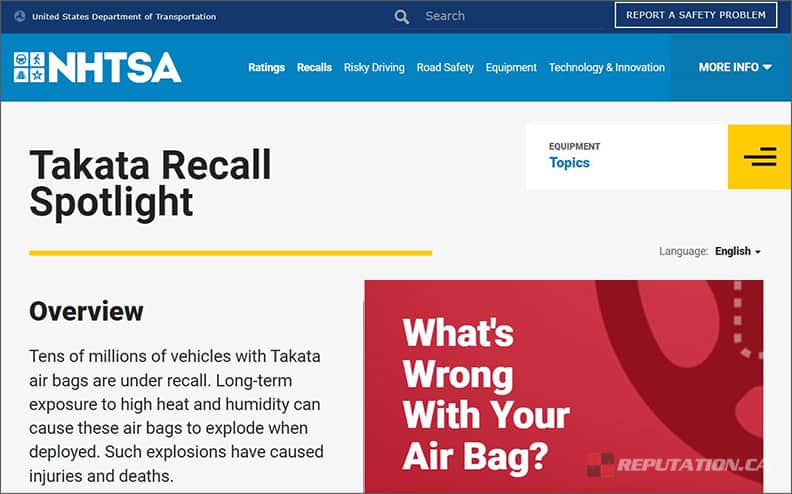
Customers expect that the products they buy are functional out of the box. So, it is reasonable to expect them to become upset when their new purchase winds up being a waste of funds. It also falls to the company to make things right with their customers when these situations pop up. Otherwise, your company’s reputation will plummet, and you will be viewed as a company that sells shoddy products that cannot be trusted. This will cause future customers to avoid your products based on what is said.
#3: Poor Customer Service
Customer service has a direct correlation to the previously mentioned quality control issues. When a product the customer has purchased is not functional, they tend to reach out to the company directly to seek resolution. This is where a company’s customer service system comes into play.
It falls to the company’s staff to address the concerns and issues of the customers to help resolve the problems with the purchase or retained service. However, the customer service offered by the company can occasionally be less than ideal in some companies. Too many customer service departments are uninvested in resolving the issue. This is often because the customer is hostile with customer service personnel.

Maintaining a level head while addressing irate customers is critical to preserving a solid reputation for the company. If your customer service personnel become combative and return the hostile disposition, they will only justify the customer’s anger and lead to reputational damage.
Ensuring your customer support branch can maintain a diplomatic approach with an irate customer will also ensure that your reputation remains sheltered from harm due to a heated exchange. It will paint the company in a light that makes you seem uncaring of the concerns and plights of your customers.
One lesser-known yet highly disturbing instance of poor customer service occurred in 2010. The mobile service provider Verizon had an employee who was extremely disrespectful to customer Cynthia Lacy. Lacy’s father passed away the previous December, but Verizon continued billing Lacy for her father’s mobile service plan despite receiving his death certificate. When Lacy contacted customer support, the representative told her there was nothing they could do and laughed at Lacy before hanging up on her. Verizon only corrected these actions after Lacy contacted St. Petersburg Times and reported her story.
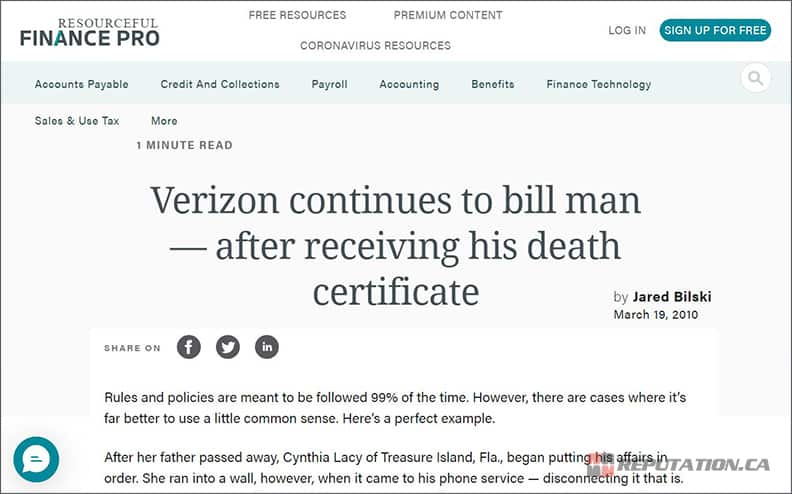
This type of reputational damage is tough to reverse without significant adjustments to your company’s customer service policies and quality assurance measures. However, customer service does not exclusively extend to phone calls or e-mails from unsatisfied customers. There is also the concern of internet reviews.
#4: Internet Reviews
Reviews left by customers on the internet are one of the most significant sources of reputational damage to a company. Most reviews are negative because satisfied customers are not as compelled to leave them. Rather, the online review system has become more of a weapon for unsatisfied customers than a tool for satisfied ones. Unhappy customers are 2-3 times more likely to leave a review about the company than a happy customer is. As a result, most reviews on a website are likely to be worse for your reputation than good.
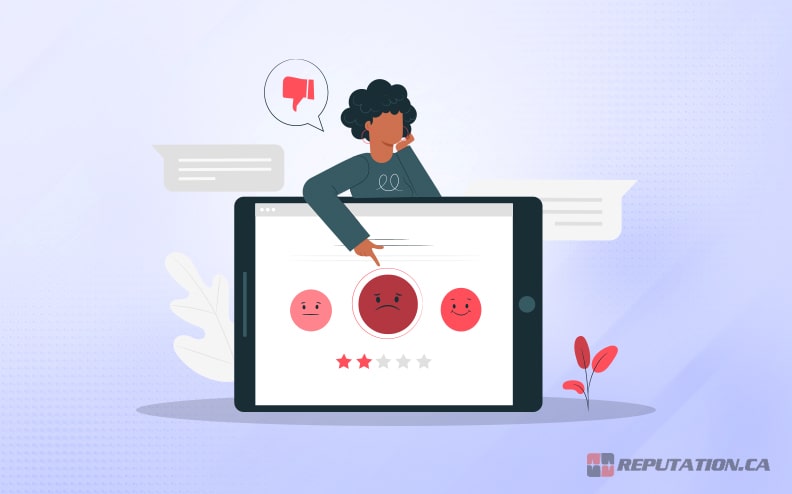
These reviews can severely damage the perception your potential and current customers hold of your company. When the customer leaves a review, there are two possible ways things can break down:
- You address the main concern of the review and attempt to resolve the cause of the customer’s dissatisfaction.
- You become defensive and argue with the customer over their review.
The first option is ideal for preserving your company’s reputation, whereas the second will damage it. Showing an interest and care for your customers’ grievances will present your company as one open to criticism and show a willingness to resolve the problem. After a poor product review, this can be just what your company needs to restore its image. Leaving these reviews to sit without attempting to resolve them will destroy your reputation.
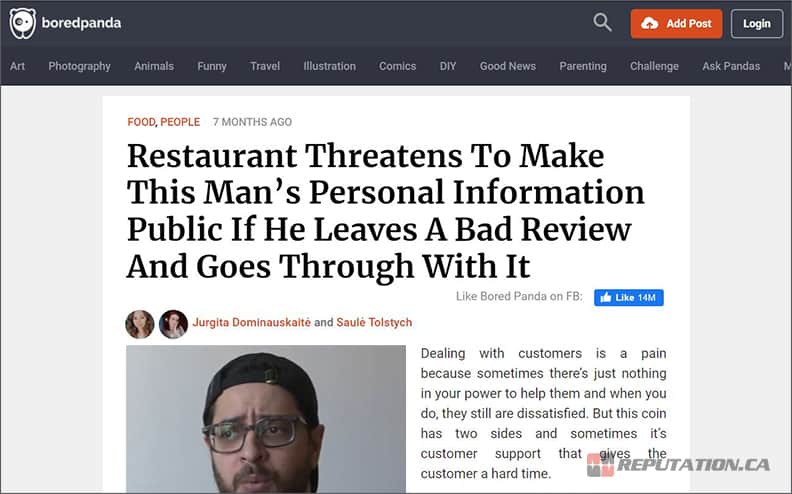
Failing to respond properly to a review of your business could lead to mass coverage of your response and further emphasize the review. Earlier this year, there was an incident where an UberEats customer ordered food from Get Stuffed, a restaurant in New Jersey, and did not receive his order in the estimated time. When he asked about his order status, he was belittled by the customer service staff, and he left a bad review of the restaurant. In response, Get Stuffed began posting his personal information (phone number, address, etc.) and was subjected to extreme criticism for their behavior.
Social media has become something of a similar case to online reviews. Social media posts are a tool your customers use to connect. This has made it a tool for connecting worldwide no matter where people are. However, it was inevitable that companies would begin to use it to connect with their potential customers. It also allows them to promote their services and products directly to the target audience. That being said, social media has a dark side that turns it into a double-edged sword.
There has been a recent spike in social media policing in which users scrutinize the posts of other users and companies. If the posts are found to be off-color or politically insensitive, it can turn a portion of your customers against you. This can also severely impact your company’s reputation, showing your company to be one that discriminates or makes light of certain world occurrences. It can be difficult to keep up with changing political and social discourse, but it’s essential to do.

Protecting your company’s reputation on social media usually involves taking care when selecting the words you use in posts and the post’s message. This can mean putting more thought into the posts you otherwise would post without consideration. The best course of action is to err on the side of caution and keep your posts about the product you are offering. This is not to say you should not enhance the post with a pun or joke to try and connect with your readers. However, keeping the humor clean will ensure that the post does not come back to haunt you.
A well-known example of social media posts gone wrong in the corporate world can be traced back to Adidas’ faux pas in 2017. To market itself, Adidas’ public relations team posted a congratulatory message to the runners of the Boston Marathon on the company’s Twitter profile. Unfortunately, the post read, “Congrats, you survived the Boston Marathon!” While such a post would normally be innocuous, Adidas inadvertently harkened to the 2013 bombing at the Boston Marathon.
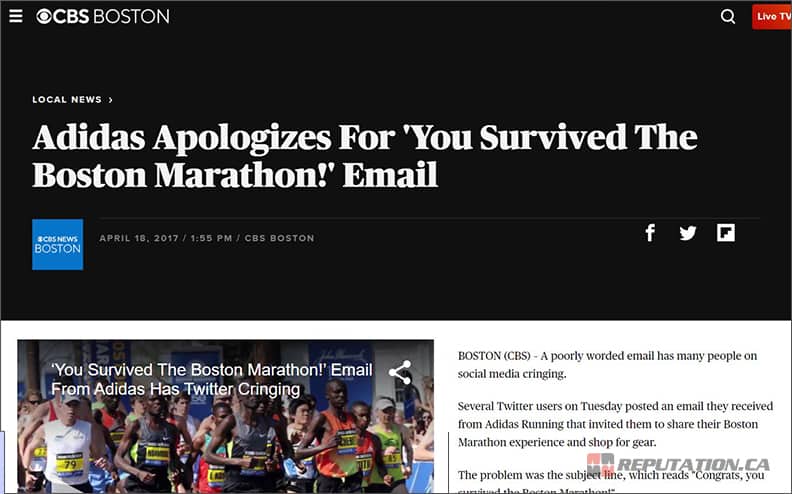
Social media is an extremely powerful weapon against a company’s reputation. Especially since if your posts are viewed as inappropriate by some, word will spread quickly through social media channels. Social media opens your reputation up to being damaged; it also serves as a potential medium to spread the damage.
#6: Smear Articles
Whenever a company achieves a measure of success, media outlets look for any sign of misconduct on their part. Sometimes, the allegations levied against the company are valid, but other times, they are designed to smear the company. Not because the company failing benefits the media outlet, but because controversy improves the number of clicks on an article. These articles are a common method for debasing a company and turning customers against them with minimal effort. Unfortunately, this method requires intense damage control to manage.

When an article is posted about your company that is not truthful, it is a form of libel that can be countered via legal action. Libel is a form of defamation that can harm your reputation even when unsubstantiated. However, it is also illegal. Taking advantage of anti-libel policies can be an excellent way to mitigate any potential fallout caused by the article. However, if the article is true, it might require you to acknowledge the situation publicly and address the allegations.
You will likely need to apologize for the actions outlined in the article if they are accurate. However, these articles can damage your company’s reputation if left alone. Luckily, most articles can be fought back through cyber libel tools.
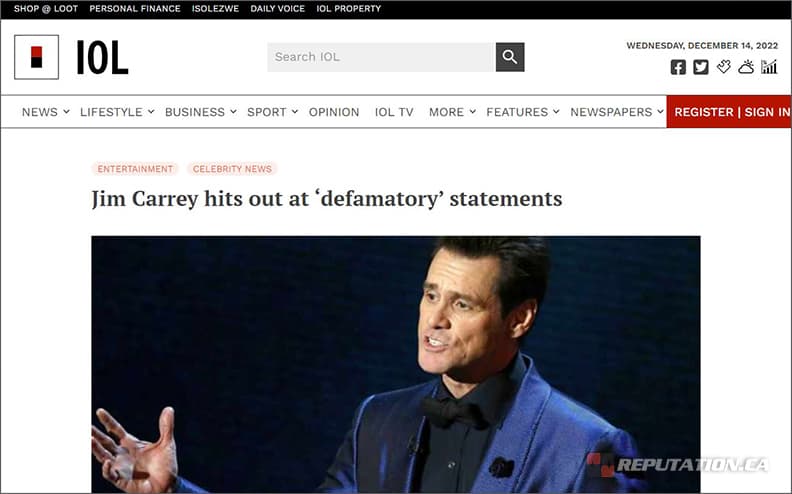
Some of the most common victims of libel and slander are celebrities, who are constantly scrutinized by the public. One of the more explosive examples involved actor Jim Carrey, who fell under fire after his ex-girlfriend accused him of introducing drugs, prostitutes, and STDs. Following the death of Carrey’s ex-girlfriend, several media outlets began printing libelous articles about his alleged transgressions. Carrey was ultimately able to combat these articles with a successful defamation lawsuit, but his reputation remained damaged.
Take Your Reputation Back
A company’s reputation is an extremely fragile thing. Even allegations of poor service and conduct can severely damage your company’s reputation. When this happens, it can cost you clients and revenue while driving the company. Some tactics are more common than others to destroy a company’s reputation. However, there are also tools you can use to protect your company’s reputation from the ramifications of these tactics. That said, protecting yourself from these damages can be difficult to accomplish independently. Fortunately, there are resources you can use to have a 3rd party manage your reputation on your behalf.

That is where we at Reputation come into play. We have made it our mission to assist companies and individuals in managing and protecting their public image. Be it through social media posting, review management, or even libel countermeasures, we work tirelessly to make sure your company does not become the victim of reputational damage. Your reputation should never be allowed to fall due to the actions of others if you do not deserve it. So, if you want some help managing your reputation, contact us and take your reputation back today.
Do you have any questions about how you can prevent damage to your company’s reputation? Was there anything that we mentioned in this article that you’d like additional clarification on? If so, please feel free to reach out and contact us at any time! We’d be more than happy to answer any and all of your questions, and assist you however we possibly can!




